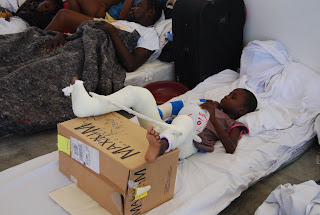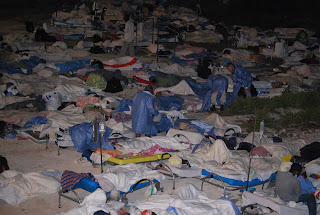This Story was posted on the LCMS website and documents the most recent Mercy Medical Team trip to Kenya last June. The article was written by Kim Krull. Enjoy!
Deaconesses with the Evangelical Lutheran Church in Kenya took part in a new home-based care training program, June 3-16, in Atemo. Mercy Medical Team members led the training and also treated more than 2,000 patients.
The most recent Mercy Medical Team (MMT) to serve in Kenya treated more than 2,000 patients and led a new home-based care training program to equip deaconesses to help ailing Africans with physical as well as spiritual needs.
"Home-based care is very important in Kenya and other African countries where AIDS is a huge problem," said Jacob Fiene, manager, Medical/Material Resources with LCMS World Relief and Human Care (WR-HC), which sponsored the June 3-16 trek to Atemo, a village in western Kenya. "This training gives people who serve at the grassroots level basic nursing skills and knowledge to use when they make home visits."
Fifty-two deaconesses with the Evangelical Lutheran Church in Kenya (ELCK) participated in the educational seminar. Topics included wound care, sanitation issues, and distinguishing myths from medical facts.
"There is a lot of misinformation out there, especially in regards to HIV," said Fiene, who worked with the ELCK’s Rev. David Chuchu and Kenyan health officials to launch the home-based care program.
Because Kenyan pastors serve multiple congregations, deaconesses shoulder many responsibilities, including visits with the sick. Deaconesses are theologically trained, Fiene said, and equipping them with basic nursing skills enables the women to care for both body and soul.
Two deaconesses will continue with advanced training. The goal is for these women to become certified trainers and teach future home-based care programs that reach even more Kenyans.
"By holding this one seminar, we created an opportunity that will enable care for many people even after a Mercy Medical Team returns home," Fiene said.
At the Atemo clinic, MMT volunteers worked with Kenyan medical volunteers to treat 157 cases of malaria, deliver three babies, and care for people suffering with infections and other diseases.
MMTs include health professionals who provide care in underserved communities in cooperation with local LCMS partners. Future MMTs are scheduled for Madagascar (Sept. 30-Oct. 11) and a return trip to Kenya (Nov. 4-15). Plans are in the works to return to Haiti. Check the WR-HC website for updates.
Any funds not needed for this relief effort will be used for other disaster purposes as determined by LCMS World Relief and Human Care. Your gift is tax deductible to the extent permitted by law.
Where to Go for Gorilla Tracking in 2025
6 months ago

 Today was the first day of clinics in Port of Prince. This is our fourth team and the third that I have led.
Today was the first day of clinics in Port of Prince. This is our fourth team and the third that I have led.






